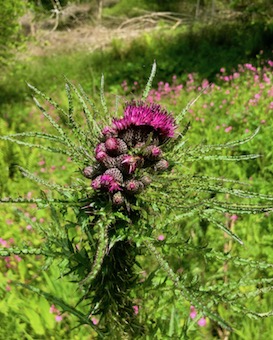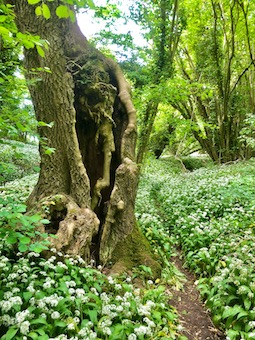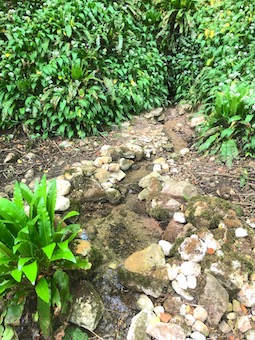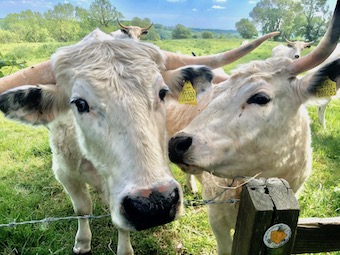
Quarry Hill looms on the skyline to the south of the village. A steep climb up, and we have the hilltop to ourselves, a humpback plateau of thin grass over limestone where the last of the early purple orchids are bowing to the inevitable. We savour the moment in an absence of traffic roar from the all-but-deserted valley road. We sit and stare round the compass, north over the village to the snaky curves of Slippery Lane, west over the massive dark red face of the old quarry and on down into a place apart, the green vale of Dragondown.
The vale lies under Quarry Hill, and a dragon lies under the vale. So the old story says. Anything or anyone could be hiding in those dense old woods that cap the slope beyond. Massive thistles grow six feet tall there, their multiple heads packed tight, defended by collars of formidable spikes.

A wandering path climbs in among the trees, and as it dips we find ourselves ankle deep in wild garlic whose flowers are beginning to droop in the shade of the canopy. A little spring issues from a cleft among the garlic, trickling along channels between miniature walls of rounded stones placed there by hand. Who could have the time and involvement to create such a water garden? We get our answer down in the heart of the wood when we spot a cluster of canvas tents and round wooden houses deep among the trees. No flimsy benders, no moth-eaten shelters here. These are proper dwellings stoutly made and carefully maintained, with a cookhouse, a pond and amphitheatre seating. These folk are not campers, but permanent residents of Dragondown Wood.

Birdsong pours through the trees, a green light dapples the path as it winds behind the settlement. On a summer’s day like this, off-grid living looks easy. In a freezing wet February it must be all about grit and stubbornness. Hats off to anyone who can genuinely live this way.
On the upland beyond we meet a bunch of young White Park cattle with black noses and long curvilinear horns. They snuff our fingers and sneeze explosively. Good job the virus is only for human consumption; not one of the heifers has a hankie.
